Can Good Communication Save The Season? Boškinac on Pag Busier Than In 2019
July 13, 2020 - Marc Rowlands interviews Boris Šuljić, owner of Boškinac on Pag, a Michelin-starred restaurant, to try and discover the secret to success in the challenging summer of 2020
Among the neverending doom and gloom of this year, a ray of sunshine through the clouds. At Boškinac on Pag, the restaurant, hotel and winery, business is booming. With better numbers than at this point in 2019, is it possible the luxury sector is suffering less this season from COVID-19? And what is the secret to Boškinac's success so far in 2020?
“I am very satisfied with this year's business,” Boškinac owner Boris Šuljić told TCN with a smile and a carefree tone to his voice. “It's definitely busier than last year. Some days are better than others but, generally, more people are coming.”
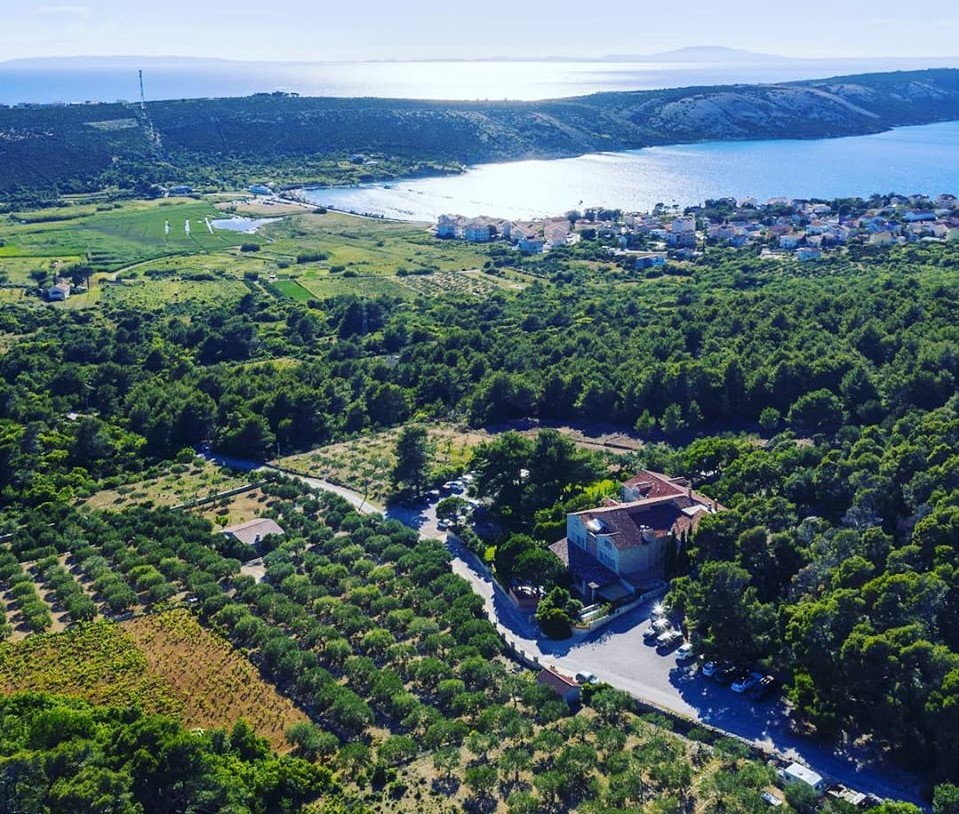
An island within an island. Pag's Boškinac is located within a lush green and neighbourless section of the island's interior © Boškinac
In a year where, depending on who you believe and how you extrapolate the info, tourism in Croatia is down by at least 50%, people sit comfortably isolated on Boškinac's large terrace. There, they take in the view of the olive trees and Boškinac's vineyards, with not a neighbour in sight. With special measures in place, seats in their Michelin-starred fine dining restaurant are similarly full. But just where are these guests coming from?
“Most of them this year have been from Croatia and Slovenia,” says Šuljić, not unsurprised. “I'd say the next largest group is foreign nationals, ex-pats, who now live in Croatia. But, also we've had quite a few from Germany, Austria, and Belgium. It's not so difficult for us to get busy. We are a relatively small hotel - 11 rooms, 55 seats in the fine dining restaurant, and 40 seats in our more informal tavern.”
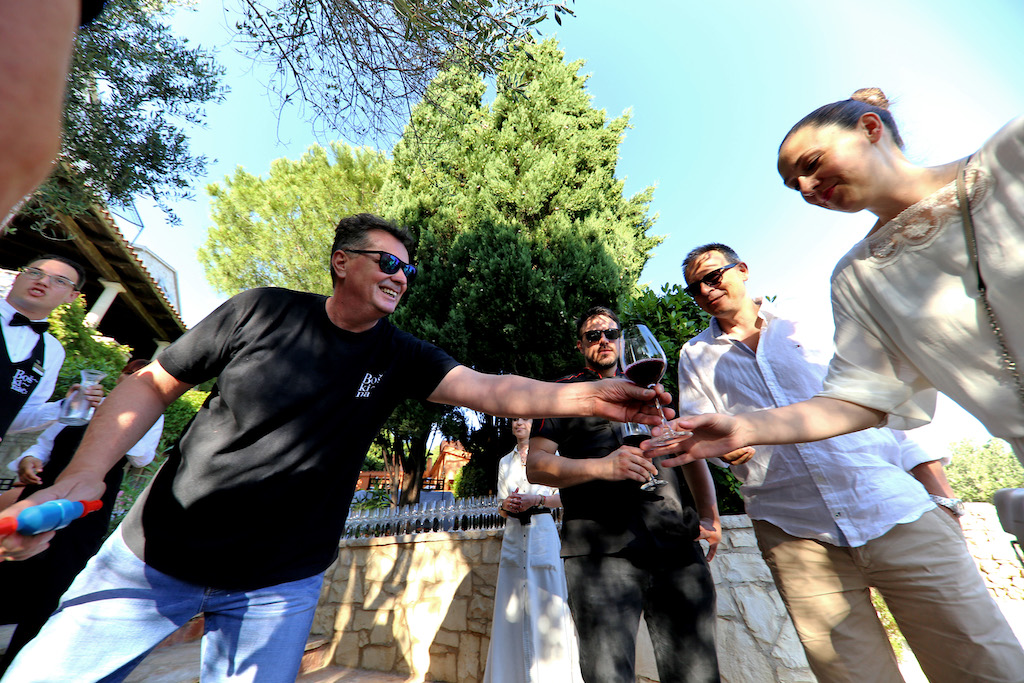
Boris Šuljić welcoming guests to Boškinac with a glass of their own-made wine in summer 2019 © Fabio Šimićev
Šuljić estimates that in total around 60% of 2020's guests have come from Croatia, 40% from other countries, a distinct change in the usual demographic they receive. Awarded a Michelin star in February of 2020, the hotel and restaurant have earned a reputation internationally for high-quality food, wines, service, and an experience much more unhurried and relaxing than that found in many places on the popular island. So, has he dropped his prices to encourage this year's draw?
“No, not at all” Šuljić tells us, “our prices remained normal. We are not so expensive like some other 4 or 5-star hotels in Dubrovnik, Rovinj, or Split. The average room price is around €200. Until 15 July, we arranged some special packages with the room and fine dining. We kept the food at the same price but offered the rooms a little cheaper in combination. It was successful. It seemed to attract people who'd heard of the hotel and restaurant, who maybe decided that right now was the best time to come and look. It's not so far to come here to check us out when you only have to travel from Split or Istria, even Zagreb, which is where many of these guests have been coming from. They stayed for one or two nights and enjoyed our Michelin-starred restaurant.”
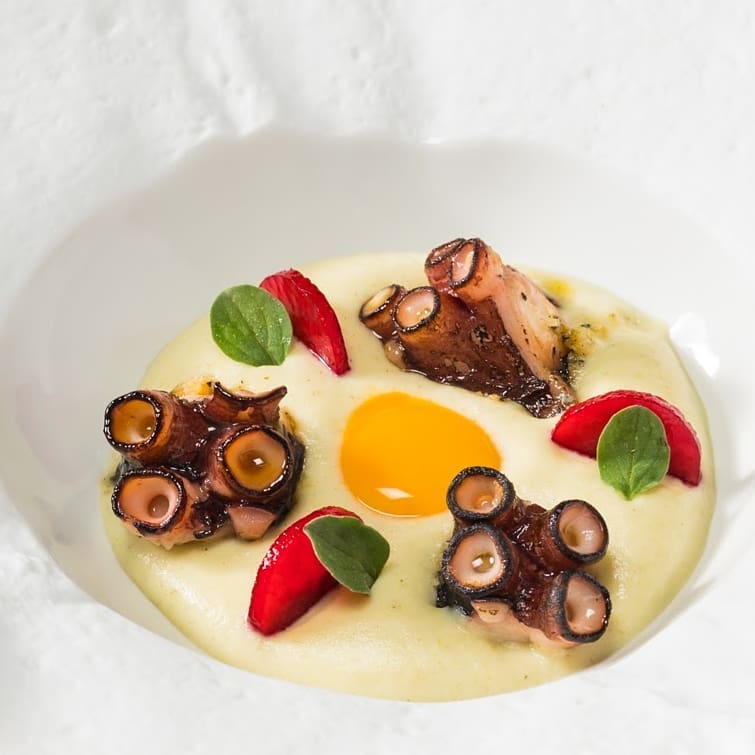
The flair with which Boškinac on Pag use their fresh, locally-sourced and premium ingredients earned them a Michelin star earlier in 2020 © Boškinac
Always keeping on top of developments in Croatia's gastro scene (you can stay updated on our Gourmet pages), one of TCN's most recent reports from Boškinac noted the venue's fluctuating success of the 2019 season. The summer's unusually variable weather was considered as perhaps one factor in the lack of footfall. With the sun shining reliably on Pag this summer, could it be that visitors care more about the weather than they do about Coronavirus? Is sun-seeking really a greater deciding factor for those looking at Croatia holidays than the ever-updating COVID-19 situation? Šuljić thinks not.
“I definitely think we're busier this year because of the Michelin star,” he says. “People seem to really recognise this international sign of quality. We got a lot of attention because of this. I think it is also because of our communication. We capitalised on the attention and we have been sending out very positive messages. We have every reason to be optimistic and it is this optimistic message we have been sending out; we are here, we are a small place, isolated, we have no neighbours, with allocations for relatively few people, but with lots of room and air and enough terrace for everyone. This is not the usual kind of busy hotel that's packed with people. We are very passionate about our food and our hotel experience. Ours is a business that concentrates on quality, not quantity.”
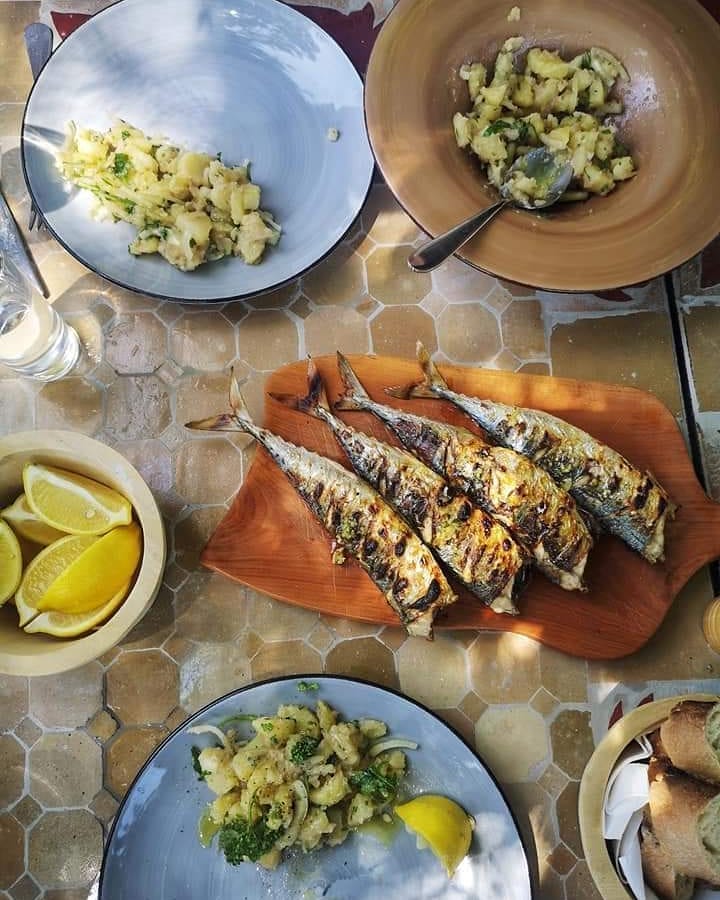
A platter of distinctly Dalmatian delights, an example of the food on offer at Boškinac on Pag's less-formal tavern restaurant © Boškinac on Pag
Though Šuljić's international recognition, unique premises and isolated location undoubtedly offer an advantage in attracting high-end clientele, could other Croatian businesses learn something from the clear and optimistic communication Boškinac has been sending out since the season's start? Well, it's an option to all but, since opening in 200, Boškinac's message and communications have been of premium importance to the business.
“We were very ambitious as soon as we opened, especially with our food,” remembers Šuljić. “But, at that time, this kind of fine dining experience was not so much recognised in Croatia. It was a very high cuisine for the time. People didn't understand what we were trying to do. Slowly we grew with our guests. It was a journey we made together. It was a gradual process. On our part, a mixture of good social media communication, some PR and word-of-mouth recommendations from previous guests was what worked best.”

Spectacular presentation, one of the many wow factors attracting curious visitors to Boškinac on Pag © Boškinac on Pag
Of course, it's too early to tell if Boškinac will maintain its story of success through summer 2020. Šuljić is aware of this. And, even though it is even more difficult to predict the rest of the season than in any other year, he remains decidedly unworried because of their experiences so far.
“It is really interesting,” he says, when asked about future bookings for this summer, “I've never known anything like it. We have so far not had any bookings further than three or four weeks in advance. It's much more week to week. For instance, right now we have zero bookings for August. Usually, I would be concerned. But, it was the same one month ago and now we are almost full. All of the bookings are last minute. People are making their decisions based on the status and the quality of the information available. They check the news and the websites for advice, make a decision and then off they go.”
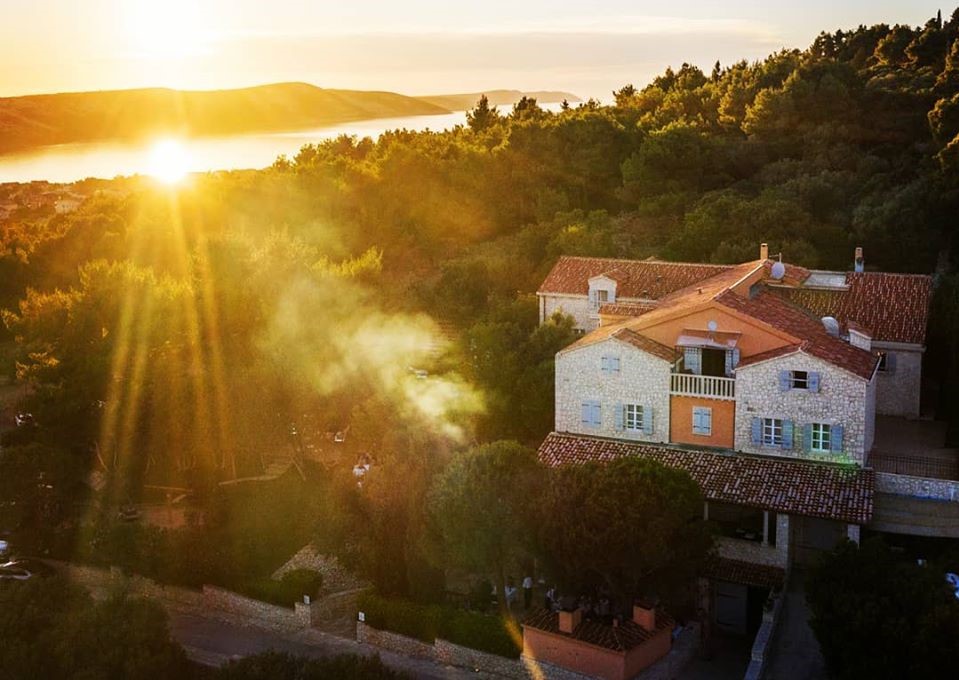
© Boškinac on Pag
For the best and most up-to-date information on Coronavirus and travel to Croatia, bookmark the Total Croatia News news page.
Total Croatia News is the best-read English language news site covering Croatia for people across south-east Europe. If you want to get your message across to those booking last-minute visits to the Croatia in summer 2020, contact us at This email address is being protected from spambots. You need JavaScript enabled to view it. to see what we can do for you.
Why Croatia's New Infections Differ At Local And National Levels
July 12, 2020 — Croatia’s Civil Protection Directorate reported 50 new COVID-19 infections, but local authorities reported 85. Why the difference?
Croatia’s Civil Protection Headquarters announced today that 50 new cases of coronavirus have been recorded in Croatia in the past 24 hours. That is good news, a significant drop from the 140 cases reported on Saturday.
The figure conflicts with numbers provided by local authorities, which suggests there are actually 85 new infections around the country. The difference can be chalked up to several factors, according to Index. Namely: varying schedules.
The National Civil Protection Directorate’s schedule varies from local bodies. It collects data from 12:45 pm one day to 12:45 pm the next day.
“Differences in numbers between national and county headquarters occur for several reasons,” the directorate told Index. “The first is reporting at different times.”
The National Headquarters publishes data at 2 p.m. The data is read every day at 12.45 p.m. and collected up to that time.
If a headquarters has a publication of results before the National Headquarters, then their reading of data from the platform will not contain the data entered from the diagnostic site in the meantime, and the opposite is true if their publication is later.
Then their numbers will include the diagnosis done after reading at 12.45 p.m.
Regarding the distribution by counties, the report of the national headquarters is based on the automatic reading of the place of registered residence from the database with HZZO insured persons.
This database is filled from the Ministry of the Interior's residence registration database, though many Croats live in one place and are registered in another.
As a public relations expert engaged in the Civil Protection Directorate explained back in April, the difference in numbers is also due to the lack of coordination in the publication of data. For example, if a county’s headquarters publishes data at 9 a.m., they refer to the last 24 hours in their area.
“There is an application that is filled in by local headquarters,” the source told Index. “The national headquarters announces at the conference at 2 p.m. what was finally entered in the application by 1 p.m.”
Krunoslav Capak on COVID-19 in Croatia: These are Big Numbers, We are Worried
July 12, 2020 - The director of the Croatian Institute of Public Health, Krunoslav Capak, spoke about COVID-19 in Croatia and the record 140 new cases on Saturday.
Index.hr reports that the number of currently active cases in Croatia on Saturday is a total of 1088. Among them, 124 patients are in hospital, of which three are on a ventilator. One person died.
Capak commented on the record number of new cases in Croatia as a guest of Dnevnik N1.
"It's not exponential growth, it would be more new patients every day, but these are big numbers, and unfortunately, we have an increase we don't want and we didn't expect it to be like that. By opening activities, we knew we would have bigger numbers, but these are big numbers now and we are worried about that. We ask the citizens to adhere to the measures because it is obviously not working as it is now," Capak said, adding:
"The virus is circulating, but I would not say that the situation is spiraling out of control. Our epidemiologists are working 24 hours a day. The situation is getting worse and worse, and we need to find, enter, and determine all contacts of these 140 people. It is hard work, and we have a total of a hundred epidemiologists. They are running out of energy."
He said they were discussing how to make things easier and when to call for help.
Capak said there are new measures from Monday and they are not thinking about adding others. "The number of people at public gatherings in other countries is smaller than in our country. Since we are a tourist country, we were too liberal in prescribing new measures. That is why we brought new measures for larger gatherings. As with nightclubs, we introduced controls and they are no longer a source of infection. We are now introducing the supervision of various gatherings, and we have tightened measures and recommendations."
Commenting on the restrictions Istria is considering, he said that they are discussing it, but nothing has been agreed yet.
"These are EU rules, I can only comment on epidemiological measures. Of course, Croatian citizens can be infected in other countries and bring an infection, but they are also subject to instructions at the borders. Every citizen who crosses, regardless of whether they are from the EU or not, receives instructions at the border on how to behave for the next 14 days, where it is prescribed to avoid contact, wear masks ... It's just a small step under self-isolation," said Capak answering the question about border crossings and noted that everything is a matter of personal responsibility:
"We had a great collaboration with the citizens, and I hope it will be the same in the future."
We are monitoring the situation with the import of the virus, he pointed out, and said that the measures have now only been tightened. Capak added that the number of border crossings had been significantly reduced.
"We are continuously discussing the gradual introduction of masks into the lives of citizens. We are careful in that, we are gradually moving from the place where the risk is greatest, and then to places where there is not so much risk of infection," said Capak, and commented on fines for those who do not wear masks:
"As the Headquarters, we are against repression because it causes revolt among citizens, especially if it is not precisely and fairly elaborated. We will conduct extensive education on the benefits of wearing masks. In some cultures, wearing masks is a normal thing for any respiratory infection. We have to activate so that the citizens understand that they benefit from wearing masks," concluded Capak.
To read more news in Croatia, follow TCN's dedicated page.
Croatia Reports Record-Breaking 140 New COVID-19 Cases
July 11, 2020 - After the numbers of new COVID-19 patients hit the three digits in Croatia for the first time yesterday, today the new record has been reached - 140.
The National Civil Protection Authority reported today that the current number of active cases in Croatia is 1,088, with 124 people hospitalized, and 3 on ventilators. Since February 25, when the first case of COVID-19 infection in Croatia was reported, 3,672 people have contracted the disease. 118 patients have died so far, including one patient who passed away in the last 24 hours.
1,322 people have been tested in the last 24 hours, for a total of 92,808.
Even before the official numbers were reported by the Civil Protection, Croatian media reported on the record-high numbers. Istria County reported they have four new cases, Zadar County seven, Osijek-Baranja County reported they had 50 new cases (out of 174 tested), 42 of them from Đakovo, including 37 nuns from the already known hotspot. Vukovar-Srijem County reported they have 12 new positive cases, Zagreb has 35 (out of which 7 can't be contact-traced), Split-Dalmatia County has 12 new cases and Zagreb county 6. The total numbers reported by the national headquarters may differ from those reported by the local authorities because they don't all report for the same 24-hour period.
At the same time, Slovenia has reported that the number of new COVID-19 cases there has doubled, and Bosnia and Herzegovina has also set a new record, with 316 cases in the last 24 hours.
For the latest travel info, bookmark our main travel info article, which is updated daily.
Read the Croatian Travel Update in your language - now available in 24 languages
Croatia Hosting 500,000 Tourists, Nearly All Of Them Foreign
July 11, 2020 — Half-a-million tourists are in Croatia, a new high for the year.
According to the eVisitor system, which includes tourist traffic realized in the commercial and non-commercial segments and in the nautical industry, more than 500,000 tourists are staying in Croatian destinations, of which about 430,000 are foreign tourists.
It’s the first time this year Croatia crossed that threshold. Most foreign guests are from Germany, Slovenia, the Czech Republic, Poland, Austria, Slovakia and Hungary.
“We generate the largest tourist turnover from those markets where we carry out intensive promotional activities aimed at positioning our country as an interesting, but above all safe tourist destination,” said Kristijan Staničič, head of the Croatian National Tourist Board, in a press release. “The achieved results prove that we succeeded in that because Croatia is one of the few tourist destinations in the Mediterranean where tourist traffic is realized.
“We expect guests from distant non-European markets, but also from the UK, France or Scandinavia during mid-July, with an increase in the number of airlines that will positively affect the overall traffic in the country, especially the results of destinations in central and southern Dalmatia.”
Almost 600 thousand arrivals were realized in Croatia (46 percent of the results achieved during the same period last year) and 4.4 million overnight stays (53 percent of the results achieved during the same period last year) in the period between July 1 and July 10.
Looking at overnight stays realized in the same period by counties, most of them were realized in Istria (1.2 million overnight stays), Primorje-Gorski Kotar (975,000 overnight stays) and Zadar County (819,000 overnight stays). They are followed by Split-Dalmatia County with 706,000 overnight stays, Šibenik-Knin County with 321,000 overnight stays, Dubrovnik-Neretva County with 188,000 overnight stays and Lika-Senj County with 167,000 overnight stays in July.
Looking at the destinations, most overnight stays so far in July were realized in the destinations Vir, Rovinj, Medulin, Mali Lošinj, Poreč, Umag, Crikvenica and others.
Marko Kašić, A Croat From Knin Trapped in Philippines Raises €50K For Country's Poorest
July 10, 2020 - Marko Kašić a Croat From Knin, trapped in the Philippines for four months by a COVID-19 travel ban, puts his time to good use.
Nothing to do, nowhere to go, nobody to see. Even with the world (online) at their fingertips, some people met the strictest period of Coronavirus lockdown with negativity that bordered on despair. But, the response depended on your attitude.
Of course, some people had it worse than others. Now stranded in the Philippines for four months because of the country's COVID-19 travel ban, you couldn't say Marko Kašić had it easier than anyone. Over 10, 000 kilometres from home and family, he might have had more of a reason to despair than most. But, that never happened. Instead, Marko spent his time raising over €50, 000 to help the country's poorest.
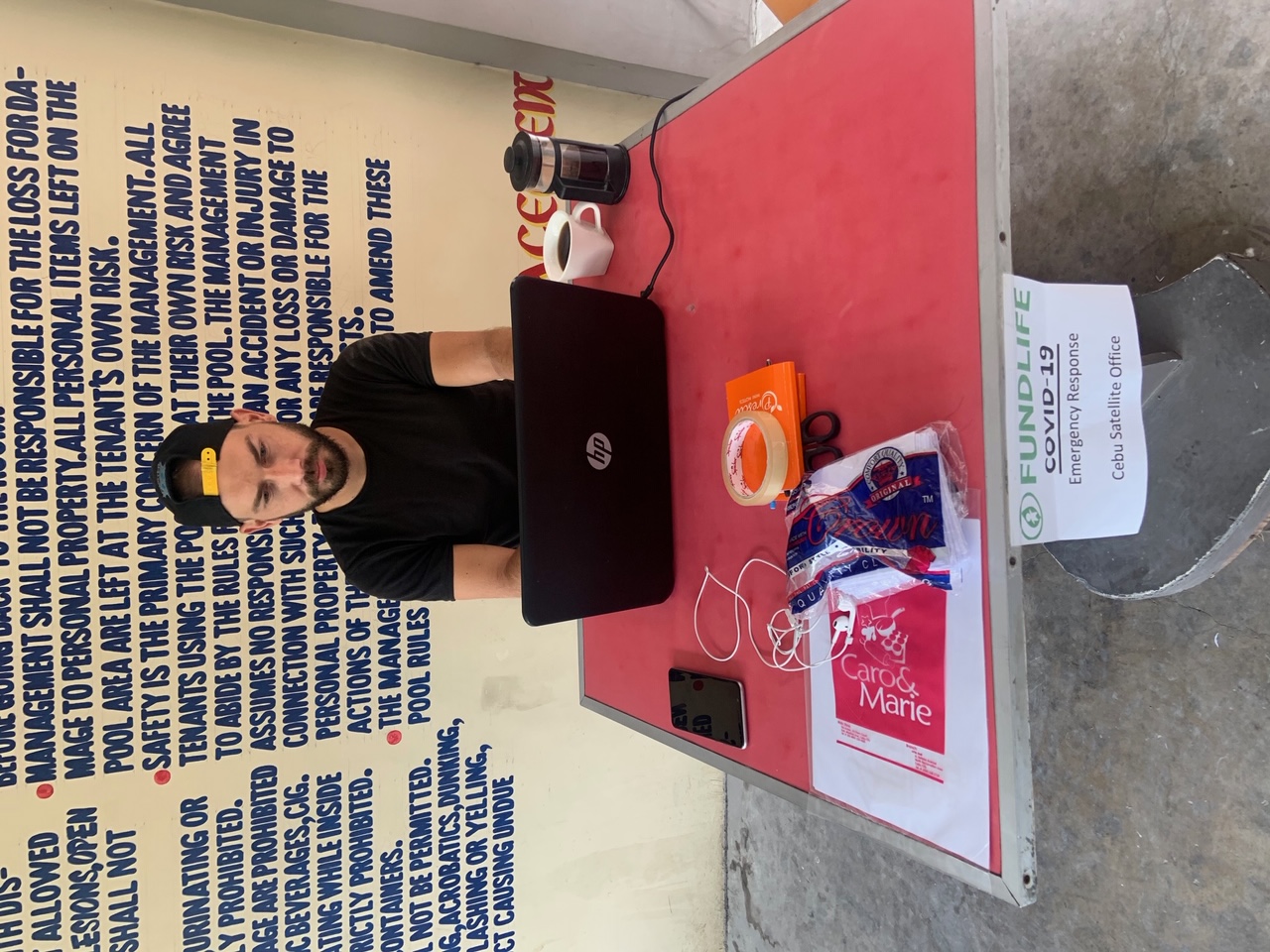
Marko Kašić, a Croat from Knin at work in the Philippines © Fundlife
Having first visited the Philippines almost a decade ago, Marko is more than familiar with the country. In 2014 he set up the Fundlife NGO there to promote sports – specifically football – to underprivileged children. He even has a girlfriend there. It was while visiting her in Manila for Valentine's Day in February that he got trapped.
After the romantic day was finished, Marko decided to take a short internal plane ride over to Cebu, on one of the archipelago's other islands, to check up on his sports projects. Then Coronavirus hit. The country went into lockdown with a strict travel ban. He could neither travel back to Europe nor to his girlfriend in Manila.
Even in a country infamous for the huge disparity between its rich and poor, Cebu, where Marko is trapped, is one of the most impoverished areas. Over 40% (800,000 people) of its residents are informal workers, with 'no work, no pay' contracts and no social services to rely on for help. When there is work, such people work for an average of €3 per day. But, because of Coronavirus, all of the work stopped.
“Even before COVID, they were just able to survive by having this small daily income,” Marko told TCN. “When the lockdown started, it was clear they would struggle to have enough food.”
Marko realised he had to do something for these people, simply because nobody else was. The bloody Drug War instigated by the country's President Duterte has been the biggest international news story about the Philippines since 2016. Fundraising, charity and NGO work for the country's poorest has suffered as a direct result. But, Marko hit up all of the contacts he'd made for help. He has raised over €50, 000 to help feed the country's poorest, taken on many volunteers to help distribute food and changed his sporting NGO into the largest volunteer-led humanitarian response to COVID-19 in the Philippines.
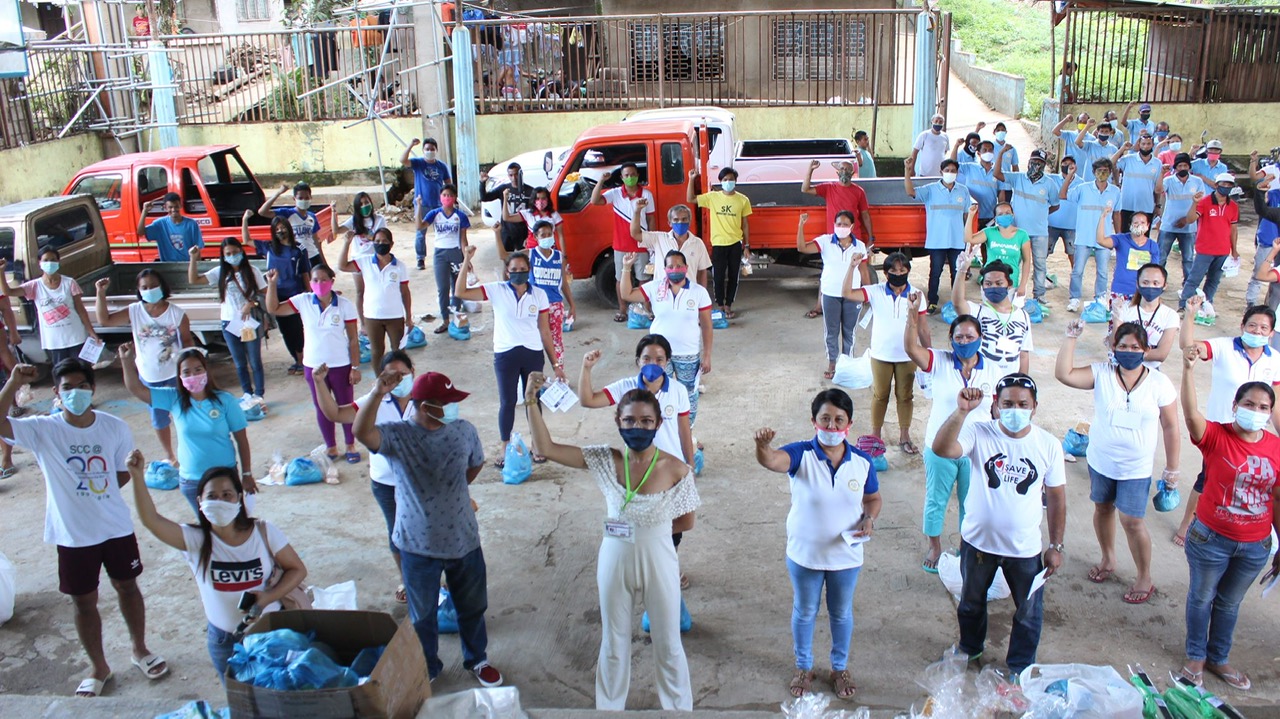
Some of Marko's volunteers at work for Fundlife's COVID-19 response © Fundlife
Perhaps it is the years Marko spent living in the UK that prompted his positive response to the situation he found himself in? But, in his compassion, his Croatian heart is clearly visible. Born in Knin, Marko's NGO has already helped over 60,000 children in the Philippines and even took some to the 2018 FIFA World Cup in Russia as part of the FIFA Foundation Festival. European football organisations are among the financial supporters of the NGO.
Asked about his plans for the immediate future - whether he will fly back to Manila, to his girlfriend, or back home to Europe - Marko has no answer. The country is still on lockdown. He still cannot travel. And, besides, there's still so much work there to do.
"I might not even have a girlfriend anymore,” Marko told TCN, perhaps only half-joking. “I told her I'd be back in a week, but it's been four months. I hope she understands."
To learn more about the work FundLife is doing in the Philippines or to support their relief efforts, you can visit www.globalgiving.org/projects/covid-19-relief-response/ or email This email address is being protected from spambots. You need JavaScript enabled to view it.
Croatia Reports 91 New Cases of COVID-19, One Fatality
ZAGREB, July 9, 2020 - A total of 91 people have been diagnosed with COVID-19 in Croatia in the last 24 hours, one person has died and three are on ventilators, the National Civil Protection Authority said on Thursday.
The number of active cases currently stands at 978, the authority said on its website.
Of the active cases, 100 are receiving hospital treatment and three of them are on ventilators.
Since February 25, when the first case of infection with the novel coronavirus in the country was reported, 3,416 people have contracted the disease, and of the 115 have died while 2,323 have recovered.
Currently, 4,410 people are in self-isolation.
So far, 89,764 people have been tested, including 1,529 in the last 24 hours.
HRK 30 MN to Be Reallocated for Quarantine and Out-of-Hospital Accommodation
ZAGREB, July 9, 2020 - The government on Thursday decided to reallocate HRK 30 million of budget funds to cover the costs of legal entities and civil protection operational forces mobilised to set up quarantine and out-of-hospital accommodation facilities and support quarantine facilities during the COVID-19 epidemic.
The Finance Ministry had made the recommendation, which the government adopted, to reallocate HRK 30 million from the 2020 budget, more specifically from the budget of the Economy Ministry's directorate for commodity reserves.
That will secure funds required to settle the costs of legal entities and civil protection forces mobilised to set up quarantine and out-of-hospital accommodation facilities and support the work of quarantine units by providing food supplies, transport, disinfectants and the like in an effort to curb the COVID-19 epidemic, Finance Minister Zdravko Maric told the cabinet.
The civil protection authority mobilised 113 legal entities and operational civil protection personnel with the aim of setting up quarantine and out-of-hospital facilities and it is estimated that the cost of those operations amounts to HRK 30 million.
Croatia Reports 53 New Cases of COVID, One Coronavirus-Related Death
ZAGREB, July 8, 2020 - In the last 24 hours, 1,375 tests for COVID-19 have been performed in Croatia, and of them, 53 have returned positive, the country's coronavirus crisis response team stated on Wednesday.
Currently, there are 934 active cases of this infection, and of the 91 are being treated in hospitals, including four placed on ventilators.
One more person infected with the disease has died in the last 24 hours, and the number of the COVID-related fatalities stands at 114.
Since 25 February when Croatia reported its first confirmed case of the coronavirus infection, there have been 3,325 people diagnosed with it. To date, 2,277 have fully recovered.
Currently, 4,539 people are in self-isolation.
Croatia has so far conducted 88,235 tests.
FAQ: What if a Tourist Gets Corona While in Croatia?
July 7, 2020 - With the two trends happening at the same time, the rising number of tourists in Croatia, and the rising number of new coronavirus-infections in Croatia, it's almost inevitable that the two will collide. What to do if a tourist gets corona while vacationing in Croatia?
We've received numerous questions regarding this relevant matter, and in this article, we will attempt to answer most of those questions. Our answers are mostly the translation and the summary of two documents issued by the Croatian Public Health Institute (one regarding tourists, and one regarding the criteria for finishing the isolation; both links to .pdf documents in Croatian).
So, in a form of FAQ, what do the people in charge of epidemiology in Croatia recommend:
1. What to do if you feel symptoms?
First of all, you need to let the people working in your accommodation that you feel ill. Every hotel, apartment, motel, or camp in Croatia should know what to do in that situation and have one person who will be in charge of that. They'll ask you not to leave your room, provide you with the surgical masks, and contact a local doctor. The doctor will determine if you're really a potential COVID patient, and organize the testing and further steps that need to be taken. You're not to leave your room until you get the test results back, and neither are your close contacts. Nobody will be allowed to enter your room, so you will have to keep it clean yourself (it will only be a day or so before your test results arrive). The food will be delivered to your door. If you test negative, the isolation measures are canceled and you're free to enjoy the rest of your stay in Croatia.
While you really shouldn't do it yourself, without coordination with the local health authorities, here's an article describing the process of getting tested in Croatia for foreigners - it will cost you 1500 kunas.
2. Do you have to get tested in Croatia?
If you report to anyone that you suspect that you have COVID, you will get tested in Croatia. If you suspect it but want to go home in order to get tested, please be advised that it's highly risky behavior, both for yourself, your family (or other close contacts) or for anyone you might encounter along the way, so at least take extra precautions (masks, gloves, no close contact with anyone).
3. If you test COVID-19 positive, do you have to go to a hospital?
No. You will be taken to a hospital if your condition is serious enough that you need to be hospitalized. If you are suffering milder symptoms, and it's considered safe for you not to be in a hospital, you will not be taken to one.
4. Which hospital?
That will be decided by the medical staff at your location. Numerous hospitals in Croatia are capable of taking COVID-19 patients, and you will probably be taken to the closest one, but the disease is unpredictable, so it's possible that things will change if you need additional care.
5. How long will you have to stay in a hospital?
Nobody can answer that question. There are so many factors, and as we said, the disease is quite unpredictable. Some recent studies show that the median stay in the hospital for those patients who do not need mechanical ventilation is around 10 days; that certainly does not mean that EVERY patient gets out of the hospital on their tenth day.
6. How much will the hospital stay cost?
Croatian media reports that the average hospitalization of a COVID-19 patient costs around 50 thousand kunas, for those patients that didn't require mechanical ventilation, and somewhere around 100 thousand kunas for those that did. Again, those are just averages and the actual cost depends greatly on the individual circumstances for every patient. The usual hospital stay per day in a Croatian hospital costs around 500 kunas, with the price going to close to 1500 per day in the ICU or on mechanical ventilation.
7. Who pays for the hospitalization?
For all Croatian citizens, all of the hospital costs are covered by the HZZO (Croatian Health Insurance).
For all EU +EAA citizens, the hospital costs will be covered by HZZO and then charged to their national health insurers.
All third-country patients will have to pay for their hospital stays and then get refunds from their travel or health insurance companies.
8. If you test positive and don't have to be hospitalized, do you have to stay in Croatia or can you return home?
Again, it depends. The local administration should have a location set-up for the patients in this situation, where they'll be able to stay for the duration of their isolation. The same goes for the close contacts of the patients, who will also be asked to quarantine. If you want to return home before your isolation/quarantine period is over, you will have to be approved by the Croatian physicians and your country's authorities. They will communicate through the IHR system and agree upon the conditions of your return.
9. How long is the self-isolation?
For those who have not tested positive, the quarantine period is 14 days.
For positive patients, it's 14 days since the onset of symptoms, and 3 days since the patient has last had fever. For positive asymptomatic patients, it's 14 days since their initial positive test result.
10. Where will you be isolated, in your previous accommodation or are there designated spots for the isolation?
The recommendations by the HZJZ linked above are completely clear: there should be organized accommodation, arranged by the local administration, prepared in advance, for the purpose of accepting foreign (and, in some cases, even some local) patients who have tested positive for COVID-19. The same is valid for their close contacts: there should also be accommodation prepared for them to stay during their 14-day quarantine.
11. Can a patient get some dental work done after the isolation is completed and the patient is no longer positive?
After you're no longer positive and your isolation is completed, you're free to do whatever you want to do - return home, stay in Croatia longer... You will, of course, need to make arrangements with the clinic where you wanted to get dental work done.
12. Do you have to get tested to show you're negative before returning back home?
Croatia does not require you to have a negative test in order to get home. If you are positive, please read answer 7 to see how your return home might happen.
If you have any other questions we haven't covered regarding the possibility that a tourist gets corona while in Croatia, let us know and we'll update this article with those answers.
For the latest travel info, bookmark our main travel info article, which is updated daily.
Read the Croatian Travel Update in your language - now available in 24 languages


